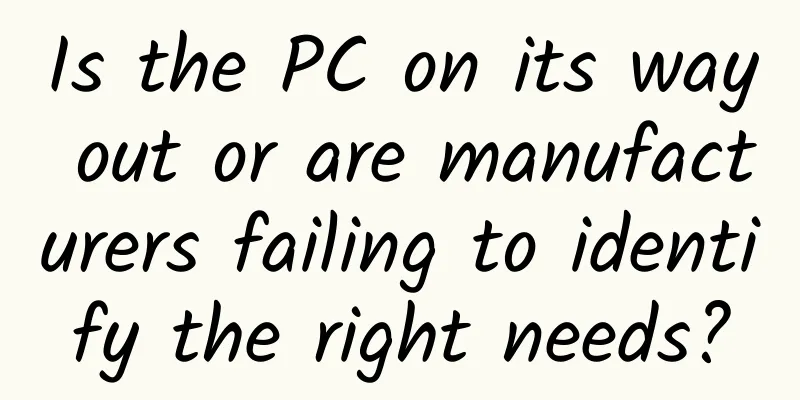Is the PC on its way out or are manufacturers failing to identify the right needs?

|
Recently, market research firm Gartner released a report on PC shipments in the first quarter of 2016, which showed that global PC shipments in the first quarter totaled 64.8 million units, down 9.6% from the same period last year (71.7 million units). Mac computers maintained a steady growth trend, with shipments of 4.6 million units (4.56 million units in the same period last year). Another market research firm, IDC, predicts that global PC shipments in the first quarter totaled 60.584 million units, down 11.5% from 68.470 million units in the same period last year. Just last year, giants such as Intel, Lenovo, HP, and Dell launched a massive marketing campaign when Skylake was launched, trying to speed up people's replacement of mobile phones and increase PC sales, but market data ruthlessly declared the failure of their efforts. What's wrong with the PC? Can it be saved? 1. PC issues People usually put the decline of PCs together with the rise of smartphones and tablets. With the rise of mobile Internet and smartphones, many things that used to be done on PCs can now be done on smartphones and tablets. In many cases, smartphones and tablets provide a better experience and are cheaper. After 20 years of popularity, PCs are basically a device that every household has. Apart from natural wear and tear, people no longer have much motivation to upgrade their PCs. Unfortunately, as a fixed device, PCs age very slowly. A PC from 10 years ago can still be used normally, except for its outdated design. And with the Windows XP system at the time, the experience was not bad either, which further slowed down the pace of PC upgrades. On the one hand, there is the impact of devices such as smartphones and tablets, and on the other hand, there is a decline in the motivation to replace old PCs, so naturally, there is a loss of sales for home PCs used for entertainment. Although commercial alternatives still exist, commercial PCs are very troublesome to replace. Migrating data and changing settings are a nightmare for system administrators. This is especially true in a country like China where old software is used extensively, so commercial PC updates are not so active. Due to a combination of factors, PC sales in the first quarter of 2016 hit the lowest quarterly level in 10 years. 2. Hope for PC After decades of popularity, the global PC ownership has reached billions. The emerging markets are very small, so the future growth of PCs depends on large-scale replacement of PCs by users. The PC itself is a device with a long service life. How to get users to discard a PC that is still within its service life and replace it with a new one is a problem that manufacturers have to face. Users are rational individuals. It costs money to abandon an old PC and use a new one. If users think that the money they spend is worth it and the new experience they get meets their expectations, they will change their PCs. Otherwise, they will not. At the same time, there is also the issue of soft costs when changing phones. Data migration requires time and effort, and software reinstallation and configuration also requires time and effort. If the hassle of changing phones is too great, users' desire to change phones will also decrease, especially for commercial users. Therefore, the hope for PC lies in providing new PCs with disruptive experiences so that users will think that the experience of the new PC is worth spending money on. At the same time, we need to reduce the cost for users to replace their PCs, which includes the price of the PC itself and the soft cost of replacing the PC. When it is convenient enough for users to change phones and the experience is improved significantly, users will naturally pay. 3. What kind of PC will trigger a wave of replacement? While PC manufacturers are facing a sharp decline, Apple's MAC is rising against the market trend. Many MAC users switched from PC. Some users use dual systems, while some do not. This shows that users are not unwilling to change their machines, but it is not tempting enough. So where does the appeal of the new PC come from? Apple's answer is high resolution. The resolution of PCs has been stagnant for too long. When mobile phones have reached 2K, it is really backward for computers to still stay at 1080P. The distance of using a mobile phone is about 30cm, while that of a computer is about 45cm to 70cm. A mobile phone is considered qualified if it reaches 300PPI, so there is room for improvement for computer screens before 200PPI. So Apple launched the 5K MAC, which has a PPI of 218. Using a higher PPI, optimizing the UI, browser, and various applications for high PPI can provide a better experience, and people are willing to pay for it. In addition to high resolution, the biggest weakness of PC is the response speed, which is caused by the bloated Windows system and the slow hard disk. Popularizing high-speed SSD hard disks as system disks can improve the startup speed and running speed, so that new computers can bring a faster experience than old computers. In addition to hardware, a new computer must also fully consider the convenience of changing devices. Almost all smartphones now have the function of changing devices with one click, while PCs are still at the level of shuffling hard drive data, which is really too backward. Develop a simple machine-changing program. Through a wired or wireless network, users can migrate all programs and data with just one click by simply checking the boxes. The old machine can either be retained or deleted. This is an excellent machine-changing experience. Although the PC is in a downturn, there is still a huge demand for replacement of the billions of existing PCs, and manufacturers cannot use the bad overall situation as an excuse for not working hard. It’s not that users don’t have the motivation to change their phones, but that manufacturers don’t make the products they want. As a winner of Toutiao's Qingyun Plan and Baijiahao's Bai+ Plan, the 2019 Baidu Digital Author of the Year, the Baijiahao's Most Popular Author in the Technology Field, the 2019 Sogou Technology and Culture Author, and the 2021 Baijiahao Quarterly Influential Creator, he has won many awards, including the 2013 Sohu Best Industry Media Person, the 2015 China New Media Entrepreneurship Competition Beijing Third Place, the 2015 Guangmang Experience Award, the 2015 China New Media Entrepreneurship Competition Finals Third Place, and the 2018 Baidu Dynamic Annual Powerful Celebrity. |
<<: Helio X25 is not powerful enough? Is Meizu PRO 6 considered a high-end flagship?
Recommend
Turritopsis dohrnii: The Fairy Dancing Between Life and Death
All tangible and existing things begin their jour...
【Smart Farmers】Ancient and magical single cells - protozoa in aquaculture environments
Take a drop of water from the breeding pond, it l...
Why are older people more susceptible to the flu?
It is currently the flu season. In this autumn an...
13 ways to promote Sina Weibo
1. Value creation of Weibo content publishing The...
Experience the first version of Android 9.0: Like these 6 changes
A few days ago, Google quietly released the lates...
Can we see the past of the Milky Way through a telescope?
The light-time equivalence mentioned here is not ...
The future of wearable technology and its applications
Wearable technology has evolved rapidly over the ...
6 Tips for Optimizing Information Stream Weight Loss Ads
Want to stand out from the crowd of weight loss a...
Behind Vivo’s amazingly thin new product: Is the phone even “thicker”?
The persistence of domestic mobile phones in stri...
More calcium than milk, more vitamin C than citrus? These hidden "nutrition kings" can no longer be hidden
As people pay more and more attention to health c...
The formula for becoming a Tik Tok influencer worth $1 million!
Tik Tok has become more and more popular, and var...
Sony ridicules PSVR: How to resolve the contradictions in the early stages of virtual reality development?
If Samsung had told everyone in advance that the ...
Apple, which is "never satisfied", continues to attack from all sides
[[136329]] Although the outside world had basical...
2019 Advertising Monetization Insights Report (Part 1)
As 2020 approaches, many media have begun plannin...
MiniLED vs OLED, can TCL X11 become the "gatekeeper" of high-end TVs?
The field of television display is facing a techn...









